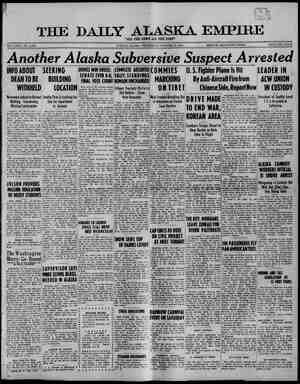The Key West Citizen Newspaper, October 25, 1950, Page 2
You have reached the hourly page view limit. Unlock higher limit to our entire archive!
Subscribers enjoy higher page view limit, downloads, and exclusive features.
RUSSIANS BACK SOVIET je ’ Taere is a gen impression in the United States that the people of Soviey a -are not backing their government ts nttitude toward the United States or in its xpressed belief that the policies of | the ‘United States constitute a threat to world peace. : President Truman seems to share this ponul: idea. He recently intimated that if the. Voice of America could get our més- sage ‘behind the Iron Curtain, the people of thé Communist countries would welcome-f, 10 YEARS AGO). Navy Day was observed by the => Key West Retary Chuh yeirerday at the elcr weexly ineeting. ere hn ie Asa $ noTiE. = A ae eerie of . . was & - tga weet cents ios | SOR to base any expectations.ipon a cleav- age between Soviet citizens.and their gov- ernmignt. Mr. Morrison BE. Salisbury, t. ports that he has discussed the world vation with many citizens of the Soviet Union. He fi that they believe that the | ¥ited to attend the Duncan. Me- | PPC VEMENTS FOR KEY WEST ADVOCATED BY THE CITIZEN we q preys > ole t | Le 4, papa 4 8 ped pes, i finuncizg provetiure he jected army sybachase Ba 8 5 ‘ . morial services hone. B ; Union is entirely right and the : xing Willian 1, Bo BOE 2cu00ls. aaditerivm, | there is ightest cleavag « Key Wen | “wishful thinking at best and may be ex- izens are-net forbidden to listen to the : 9 Chica Key C. Duncan, decrased principal af | States entirely wreng. “There are | Harris School, next Suaday after-} ings of opinion on this questi ra doubts, certainties, no qualific Re he. writes, and that any suppasiti cu day and ¥ my between piri, | A op Me this afternoon to mee? with chem- i Soviet. citizens and their ernment is | hers “Sunumigaion } ! | tremely dangerous.” Mr-Salisbury reports that Soviet cit | Voice of América programs and that th FLORI ae tkther widely equipped with short- Ess ON few regular listen viet citizens in Moscow” and even amou them, “there is no sympathy for the ican viewpoin The Russian reactior tional ¢ the broadcasts is that they are “just Am ticers 3 vurtealiy assared ican propaganda.” pe ee The New York Times writer says that | st« ugust | 1932 aid they Ameri¢ans:in the diplomatic colony “cons |** expected o¢ be Solieewd: by tinue to travel rather widely about the So- arage ap Sa gs viet “Union” and that travel regulations | Mre’/Titomes .i. Fiedes, of Ma “permit very .wide-spread travel.” He re- |@h arrwed oa - the perts that the diplomatic controversies bes ping aac 1 net tween the two nations haye not materially [Virén Pindee s( che heme, affected traditional Russian hospitality. | 9-94 street : , Concérning our action in Korea, the ‘Weiter says that the Russian seople have een led to regard the Korean conflict ag |S ay * a civil war in which the United States hag brsgurds to comsnarting 3 intervened. Our action is depicted as paral }pipe line trom : MONOGRAPH Pear Reader: The public schoo n is the bul, "eeek of popular self-government; it is earth what it costs. THE ORACLE EYE U. S. FUNDS The situation in India, we regret ‘to repert, such that many of its ‘leading @ltwens’ believe that the only solution of “the @eomemle ills of Asian, countries is fi- ‘Genelia! aid from the United States. Bebert Trembult; writing to The New: % YEAS ag Ni C. BR Grock «. the Eng meeraag. Cx York Vimes, says that nearly q ‘hundred f . editors and others, represents a mations at the eleventh of the Institute of Parifie cencleded that the area is “@ewly toward bankrupty. : sail thom is in evidence in the new na South and Southeast Asia. Condi< india, Pakigtan and Ceylon are de- e8 as “desperate” with India perhaps peret off. ete of the delegates suggested that @.000 a year from the United States he sufficient to start priming the pump. Others, however, did not the idea, fearing that the saver- the nations would be jeopai d a nel ads against the United States. Des lel and similar to the intervention by Hit--}: igr apd Mussolini on Franco's side in the Spanish Civil War. Moreover, the ordinary Soviet \ citizen sees little ground for hope that the United States will change what he considers a violently militaristic and” pro- votative policy. Mr. Salisbury reports an overwhelm- ing desire for continued peace on the patt of the Russians generally. “There appears to bé no segment of the Soviet public that desires war or that looks with ‘enthusiasm on & prospect. of war with the United States.’* He has heard of no suggestion, pub- licly_ov’ privately, that the Soviet Union should undertake “a preventive — war” his lief that the American sspeRbitr| 04 is us ing toward war, the ordinary Russian eons govern tinues to have confiderive in his fo. the which b¢ ate pores

